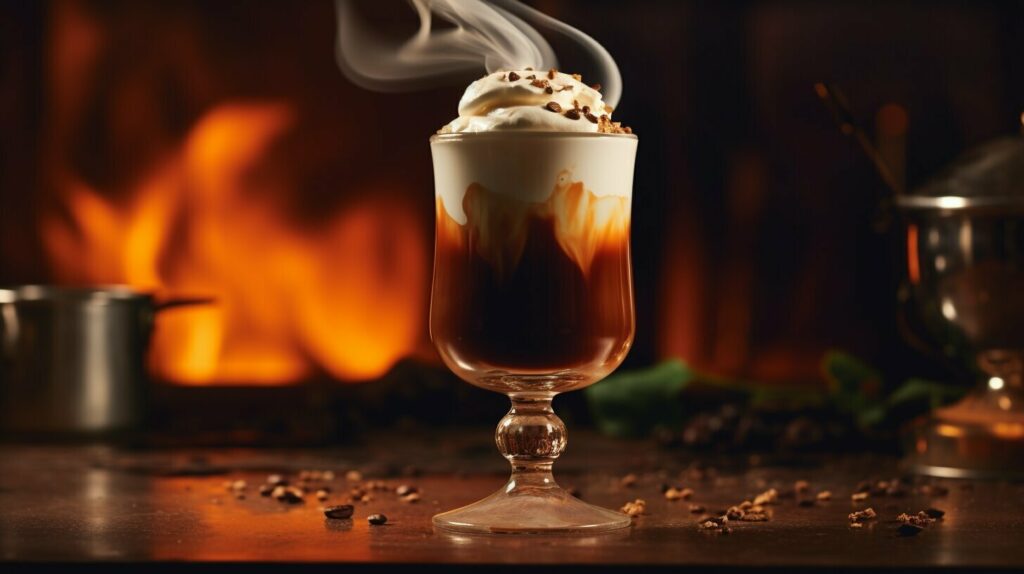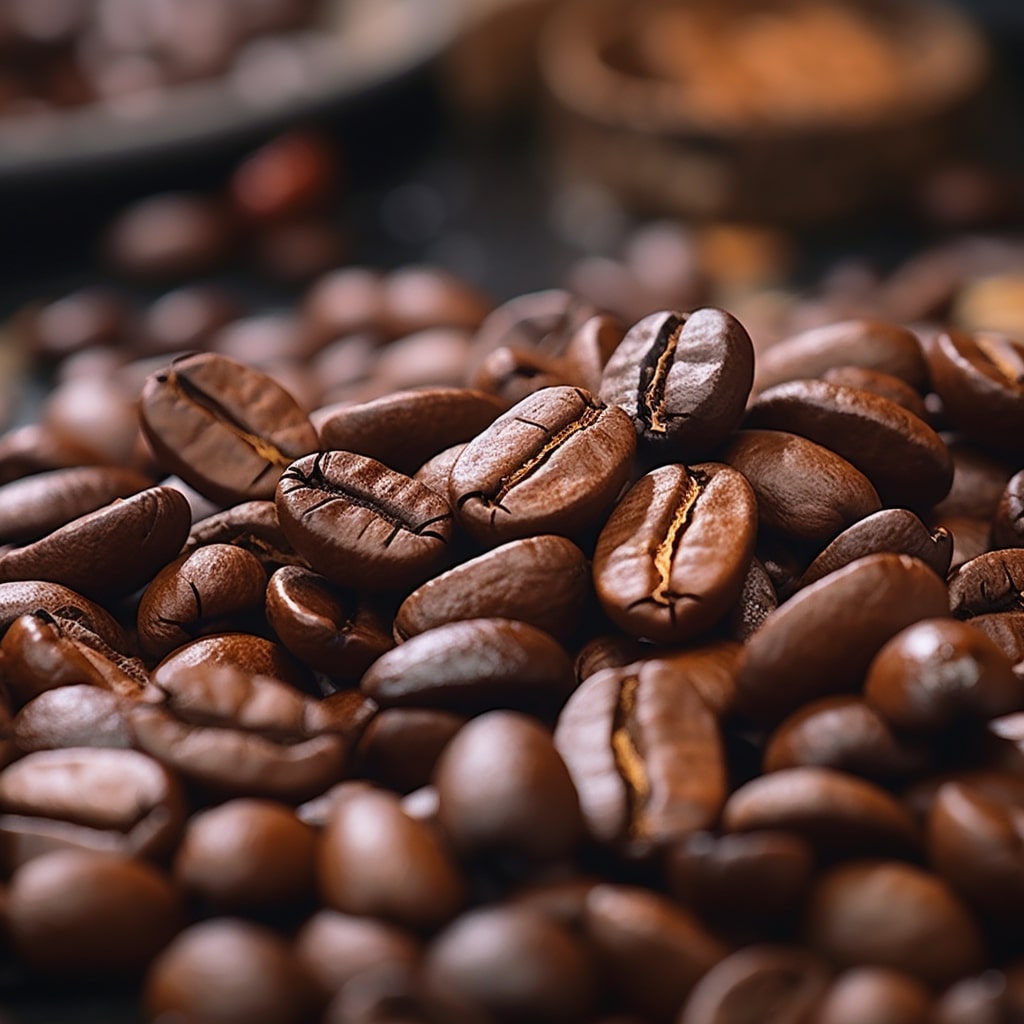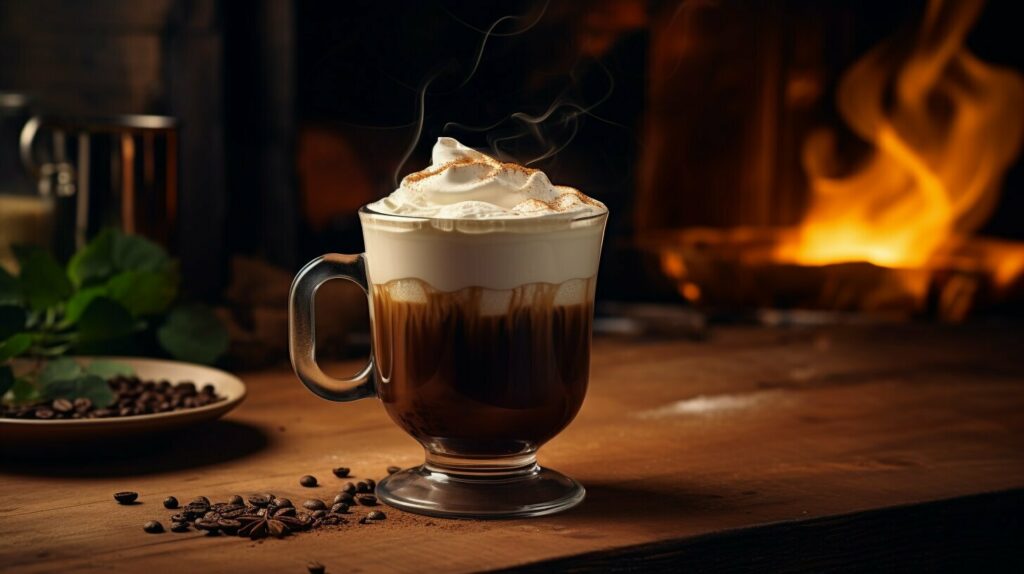Welcome to our article discussing the caffeine levels in Irish coffee. If you’re a fan of this classic cocktail, you may be wondering just how much caffeine it contains and what factors can influence its content. In this section, we’ll explore the caffeine content of Irish coffee and provide an overview of its caffeine levels.

Irish coffee is a warm alcoholic beverage that typically consists of hot coffee, Irish whiskey, brown sugar, and whipped cream. While it’s a beloved drink for many, it’s important to understand its caffeine content, particularly if you’re sensitive to caffeine or watch your caffeine intake.
Understanding Irish Coffee
Irish coffee is a delicious warm beverage that originated in Ireland in the 1940s. It is typically made with a combination of hot coffee, Irish whiskey, sugar, and whipped cream. This delightful concoction is the perfect drink to sip on a chilly evening, but have you ever wondered how much caffeine is in this popular beverage?
The caffeine amount in Irish coffee can vary depending on several factors, including the type and roast level of coffee beans used, the proportion of coffee to other ingredients, and the serving size. Generally, Irish coffee contains less caffeine than a standard cup of coffee, but it can still provide a moderate caffeine boost to help you power through the day.
Key Ingredients in Irish Coffee
Before we dive into the caffeine content, let’s take a quick look at the key ingredients in Irish coffee and how they contribute to its distinct flavor.
| Ingredient | Description |
|---|---|
| Coffee | Irish coffee is traditionally made with hot, strong coffee, typically a dark roast. |
| Irish whiskey | Irish whiskey lends a smooth, rich flavor to the coffee. The whiskey is typically added to the coffee after it is brewed and sweetened with sugar. |
| Sugar | Sugar adds sweetness and helps to balance out the bitterness of the coffee. |
| Whipped cream | Whipped cream is added on top of the coffee, creating a delicious layer of sweetness and creaminess. |
Now that we have an understanding of the ingredients, let’s explore how to measure the caffeine content in Irish coffee in the next section.

Measuring Caffeine in Irish Coffee
Now that we understand what Irish coffee is and what contributes to its caffeine content, let’s explore how to measure the caffeine levels in your cup of Irish coffee. There are several different methods to determine the approximate caffeine amount, including:
- Using a caffeine calculator online
- Consulting the packaging of your coffee beans for the caffeine rating per serving
- Using a caffeine meter
However, it’s important to note that these methods can only provide an estimate, as there can be variations in the caffeine levels depending on the preparation process and other factors.
To measure the caffeine in your Irish coffee, you can follow these steps:
- Brew a cup of coffee using your preferred method, such as drip or French press.
- Measure the amount of coffee used in your Irish coffee recipe.
- Using the packaging information or an online calculator, determine the approximate amount of caffeine in the brewed coffee.
- Measure the amount of Irish whiskey and add it to the coffee.
- Add the sugar and stir until dissolved.
- Finish by topping the mixture with whipped cream.
It’s worth noting that the type and amount of coffee used in your Irish coffee recipe can greatly impact caffeine levels. For example, using a stronger, darker coffee roast will result in a higher caffeine content than a lighter roast. Additionally, increasing the ratio of coffee to other ingredients can also increase caffeine levels.
Next, we’ll delve into the various factors that can affect the caffeine content in Irish coffee.

Factors Affecting Caffeine Content
As we discussed earlier, the caffeine content in Irish coffee can vary depending on several factors. Let’s take a deeper look into these factors:
| Factors | Explanation |
|---|---|
| Type of Coffee Beans | The type of coffee beans used can significantly impact the caffeine levels in Irish coffee. |
| Roast Level | The roast level of the coffee beans can also determine the amount of caffeine in your cup of Irish coffee. Lighter roasts tend to have more caffeine than darker roasts. |
| Coffee Proportion | The proportion of coffee to other ingredients in Irish coffee can impact caffeine levels. The more coffee you use, the more caffeine your drink will contain. |
| Alcohol Content | The alcohol content in Irish coffee can also affect caffeine’s effects on your body. Alcohol can decrease caffeine’s absorption rate, meaning that the caffeine may not have the same impact on your body as it would without alcohol. |
It’s essential to note that caffeine levels in Irish coffee are not regulated and can vary depending on the preparation method and the establishment where you order it. It’s always best to be aware of the factors that can impact caffeine content and make informed decisions accordingly.

Irish coffee can contain varying levels of caffeine depending on factors like the type of coffee beans used, the roast level, and alcohol content.
Comparing Irish Coffee to Other Caffeinated Beverages
While Irish coffee is a delicious and unique beverage, how does it compare to other popular caffeinated drinks in terms of caffeine content? Let’s take a look at the caffeine levels in some common warm drinks:
| Beverage | Caffeine Content (mg) |
|---|---|
| Drip Coffee (8 oz.) | 95 |
| Espresso (1 oz.) | 40 |
| Irish Coffee (6 oz.) | 50-80 |
| Tea (8 oz.) | 25-48 |
As we can see, Irish coffee falls somewhere in between drip coffee and espresso in terms of caffeine levels. It contains approximately 50-80 mg of caffeine per 6 oz. serving, while drip coffee has around 95 mg and espresso has around 40 mg per serving. However, it’s important to note that caffeine content can vary depending on factors such as the type of coffee beans, brewing method, and serving size.
It’s also worth mentioning that tea has a lower caffeine content compared to coffee, with an average of 25-48 mg per 8 oz. serving. However, tea also contains other compounds such as L-theanine, which may have relaxing and stress-reducing effects.
So, if you’re looking for a warm and comforting beverage with a moderate amount of caffeine, Irish coffee could be a great choice. But if you prefer a stronger pick-me-up or a lower caffeine content, there are plenty of other options available.

Health Considerations
While Irish coffee can be a delightful treat, it is important to consider its potential impact on your health. This is particularly true due to its caffeine content, which can have both positive and negative effects on the body.
As with any caffeinated beverage, moderation is key. Consuming too much caffeine can lead to side effects like anxiety, jitters, and difficulty sleeping.
It is generally recommended that adults consume no more than 400 milligrams of caffeine per day. It’s worth noting that an average Irish coffee can contain anywhere from 30-150 milligrams of caffeine, depending on the ingredients and serving size.
If you are particularly sensitive to caffeine, it’s best to avoid or limit your consumption of Irish coffee. Additionally, if you are pregnant, breastfeeding, or taking any medications that can interact with caffeine, it’s important to consult with your healthcare provider before consuming Irish coffee or any other caffeinated beverages.

| Pros of Caffeine in Irish Coffee | Cons of Caffeine in Irish Coffee |
|---|---|
|
|
FAQ – Frequently Asked Questions
Q: How much caffeine does Irish coffee typically contain?
A: The caffeine content of Irish coffee can vary depending on the type and amount of coffee used, as well as the size of the serving. On average, a standard 8-ounce serving of Irish coffee contains approximately 60-80 milligrams of caffeine.
Q: Can I choose a decaffeinated coffee for my Irish coffee?
A: Yes, you can use decaffeinated coffee to make Irish coffee. This will significantly reduce the caffeine content of your drink. However, it’s important to note that decaf coffee still contains small amounts of caffeine, typically 2-5 milligrams per 8-ounce serving.
Q: Is it safe to consume Irish coffee if I have a caffeine sensitivity?
A: If you have a sensitivity to caffeine, it’s best to avoid or limit your intake of Irish coffee. The high caffeine content can lead to negative side effects such as increased heart rate, jitteriness, and difficulty sleeping.
Q: What is the recommended daily caffeine intake?
A: The recommended daily caffeine intake varies depending on factors such as age, weight, and sensitivity to caffeine. However, most health experts agree that consuming 400 milligrams of caffeine or less per day is generally safe for healthy adults.
Q: Can I make Irish coffee with tea or other non-coffee ingredients?
A: Traditionally, Irish coffee is made with coffee, Irish whiskey, brown sugar, and heavy cream. While you can experiment with different ingredients, using tea or other non-coffee ingredients would not be considered a traditional Irish coffee.

